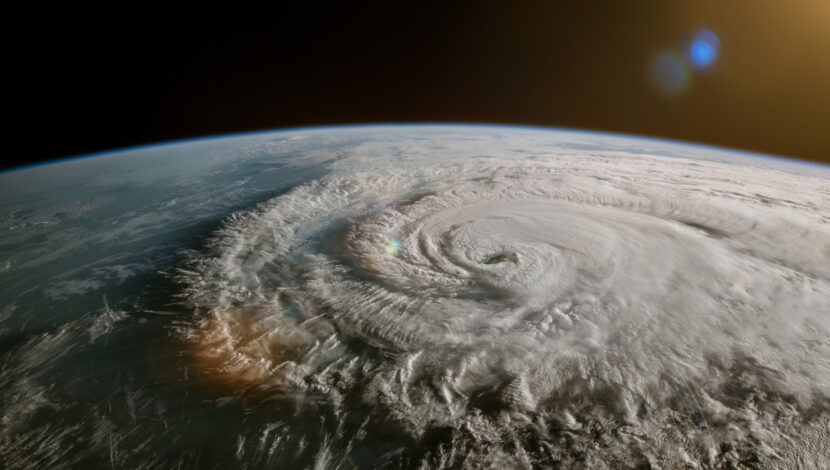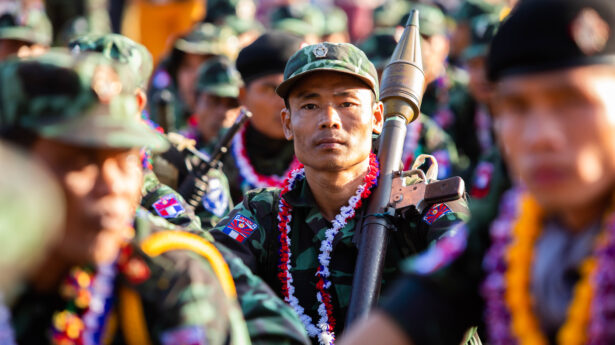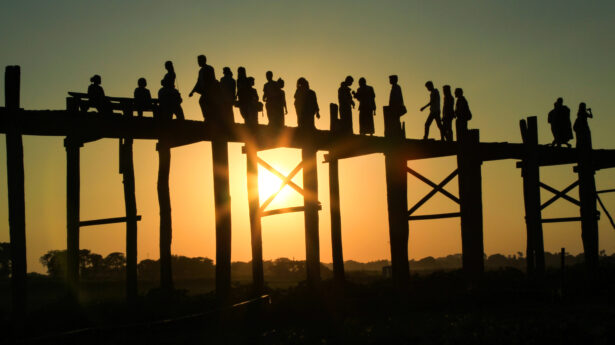The Unitarian Universalist Service Committee advances human rights through grassroots collaborations.
Burma Military Complicit in Cyclone Mocha’s Death Toll

By Michael Kourabas on June 5, 2023
On May 14, Cyclone Mocha made landfall in Rakhine State, Burma (Myanmar), before moving into Central Burma and heaping additional devastation upon communities engaged in an ongoing struggle against years of military oppression and violence. One of the most powerful cyclones ever recorded in Burma, the storm brought sustained winds of more than 200 km/hr, a deadly storm surge along the coast, severe flooding, and torrential rain. The United Nations (UN) estimates that more than 3.4 million people were severely affected by the storm, with hundreds of thousands left without shelter on the eve of monsoon season and at least 400 hundred killed in Rakhine State alone.
A core principle of “disaster justice” is that resources in the wake of disasters are not distributed equitably, reflecting and exacerbating underlying injustices, inequities, and oppression. There is perhaps no starker example of this than in the disproportionate ways Cyclone Mocha has impacted—and will continue to impact—the Rohingya and other ethnic minority communities that have been the primary targets of years of Burmese military atrocities.
On May 25, Burmese Rohingya Organisation UK (“BROUK”), a UUSC partner and leading voice in the movement for justice and accountability for the Rohingya genocide, made this especially clear in a report titled, “Preventable Deaths in Cyclone Mocha and the Rohingya Genocide.” The report lays out in detail how more than a decade of systematic oppression of the Rohingya by the Burmese military not only constitutes the ongoing commission of genocide—in violation not just of international law, but of the provisional measures imposed upon the Burmese government by the International Court of Justice as well—but also led to hundreds of preventable deaths during Cyclone Mocha.
When Cyclone Mocha tore into Sittwe, the capital of Rakhine State, it encountered a Rohingya community forced by the military to live for more than a decade in internment camps, precariously positioned in close proximity to the sea and surrounded by barbed wire and police and military checkpoints. More than 50% of the Rohingya living in these “internally displaced person (IDP) camps” in Sittwe are children. The Rohingya not living in the camps effectively live, as BROUK put it, “in an open-air prison, subjected to severe restrictions on movement and denied access to humanitarian aid and healthcare, designed to result in their ‘slow death’.” Any Rohingya who attempt to exercise their right to freedom of movement are criminalized and imprisoned. These are but a few of the facts that have led the international community to rightly call the military’s decade-long campaign against the Rohingya a genocide.
As Cyclone Mocha approached Sittwe, the junta failed to provide warnings in the Rohingya language, and BROUK is aware of only, “minimal efforts to relocate Rohingya IDPs to safety.” Due to the restrictions on their movement, if Rohingya IDPs had tried to leave on their own, without express permission and assistance, it would have been impossible. BROUK reported that survivors did not understand how serious the storm would be and were not told where to go for safety. Those Rohingya IDPs “lucky” enough to be offered transportation to overcrowded cyclone shelters were told to board military trucks—harbingers of cruelty for the Rohingya—without understanding why or where they would be going.
The result? More than 400 preventable Rohingya deaths and even worse humanitarian conditions in Rakhine State’s IDP camps, where an outbreak of diarrhea and lack of access to aid now threatens the especially vulnerable child population.
As Cyclone Mocha moved beyond Rakhine State, its disproportionate impact continued. Since the Burmese military attempted an illegal coup in February 2021, there have been more than 22,000 armed clashes and attacks displacing 1.5 million people, according to ALTSEAN Burma’s latest “Coup Watch” report. Nowhere has this violence been more acute than in Chin State and the Sagaing Region, where just last month military airstrikes killed hundreds of civilians. The UN has reported that 60-percent of the landmine incidents reported in the first quarter of 2023 were in Cyclone Mocha’s worst-hit areas. One result of the military’s campaign has been to displace more than 750,000 people in these areas, leaving them without sufficient access to clean water, food, shelter, and medicine—before Cyclone Mocha.
Elsewhere, the Burmese junta is preventing humanitarian agencies from conducting needs assessments and delivering desperately needed aid, “using its carefully constructed web of laws and bureaucratic obstacles to restrict life-saving humanitarian aid and access to the affected areas,” as BROUK’s report states. In Rakhine State, nine days after the cyclone the regime had still refused to grant the international humanitarian community unrestricted access. In other words, the military is using Cyclone Mocha as one more tool of oppression in its ongoing war against the people of Burma.
As long as the junta continues to block access to aid, the most impacted communities in Burma will continue to rely on a network of civil society organizations, including some of UUSC’s partners, for life-saving food, water, medicine, and shelter. In the immediate aftermath of the cyclone, UUSC has been able to make several small grants to our partners to help in this effort—but it’s a drop-in-the-bucket compared to what is needed.
Now more than ever, the international community must answer the call of the people of Burma and quickly make unrestricted funds available to grassroots organizations with the networks, trust, and access to get aid where it is most needed. You can support this effort by donating to our partner, Advance Myanmar’s, relief efforts and/or the U.S. Campaign for Burma Donation Page. A donation to UUSC also helps our long-term work to achieve justice and equity for the Rohingya and other ethnic minorities in Burma.
Image Credit: iStock

